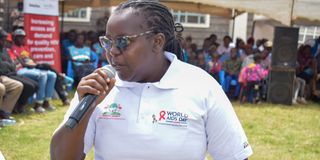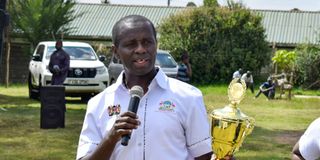Alarming rise in mother-to-child HIV transmission rates in Nakuru

Celestine Ndege addresses a crowd on December 1 during World AIDS Day in Nakuru.
Celestine Ndege wears many hats. She is a certified psychological counsellor, an HIV/AIDS advocate, a Community Health Promoter (CHP) and a mentor mother - roles she has passionately embraced for more than two decades.
"I was diagnosed with the virus in 2000," says Ndege. "At that time, stigma was rampant, creating a system that led to a psychological death even before the physical one."
As a young mother of two at the time, Ndege was not spared this stigma. For a while, she neglected her health, despite her brother's unwavering support. What she needed most was accurate information about her condition. When training opportunities became available, she decided to take them up, initially to understand her own situation better.
"I did a lot of training. At first it was to help myself, but little did I know that I'd become a source of hope for others," she says.
But before she reached this point, Ndege hit rock bottom. She fell into a cycle of self-neglect so severe that her family had to step in to care for her children.
"That was my wake-up call," she recalls. "I forced myself to eat and get better for my children. I realised that the only way to deal with my own stigma was to confront the stigma of others."
Building a legacy of hope
Fast forward to 2024, Ndege, the mother of four, has taken on even more roles, a Community HealtCHP) and Mentor Mother, and leads a support group of her own.
Her work, alongside her advocacy, focuses on supporting expectant mothers living with HIV/AIDS. She helps them build the knowledge and skills they need to ensure they don’t transmit the virus to their unborn children.
"We need to ensure an HIV-free generation. We encourage women to give birth in hospitals and talk to those living with HIV who want to have children." she says.
"If they want to get pregnant, they need to have their viral load tested, take their prescribed medication and attend regular clinic visits. In this way, they can have an HIV-negative baby. We also encourage couples to get tested together."
Despite her optimism, Ndege highlights a critical gap in the fight against HIV - adolescents. She notes that young people between the ages of five and 19 are often overlooked unless their parents are strict about adherence.
"Some teachers don't understand HIV and may shame children for bringing drugs to school, causing embarrassment and leading to discontinuation of treatment," she explains.
Adolescents who are exploring their sexuality are even more likely to stop taking their medication, contributing to new infections. Ndege is calling on the government to allocate specific funding for targeted education and care for this group.

Bernard Lugah, the County multi-sectoral HIV/AIDS coordinator, on December 1 during the World AIDS Day in Nakuru.
Bernard Lugah, the multi-sectoral HIV/AIDS coordinator for Nakuru County, echoes Ndege's concerns. He reports worrying statistics, despite ongoing campaigns to reduce perinatal and adolescent transmission.
"Mother-to-child (MTC) transmission in Nakuru County has increased over the past year," Lugah says. "In 2023, the rate was 10.7 per cent. This year, it's 13.6 per cent - well above the recommended rate of 5 per cent."
The increase is attributed to factors such as teenage pregnancies, unskilled home deliveries, and mothers stopping antiretroviral treatment (ART) or going on "drug holidays," putting infants at risk.
To address these challenges, Nakuru County is implementing several interventions.
"We are actively engaging adolescents and young adults with age-appropriate information and have an action plan to address these challenges," says Lugah.
A key strategy is to train mentor mothers and fathers - people with lived experience - to share their knowledge and encourage HIV-positive parents to adhere to treatment and ensure that their children remain HIV-negative.
Community Health Promoters (CHPs) also play a vital role in raising community awareness about HIV, referring mothers to health facilities for testing, and following up with those who miss appointments to encourage them back into care.
"As a country, we're well on the way to achieving the global goal of ending AIDS by 2030. The virus may still exist, but our focus is on raising a generation of HIV-negative children and drastically reducing new transmissions," he says.
For her part, Ndege continues to work for change, using her own journey as an example of resilience and hope.


